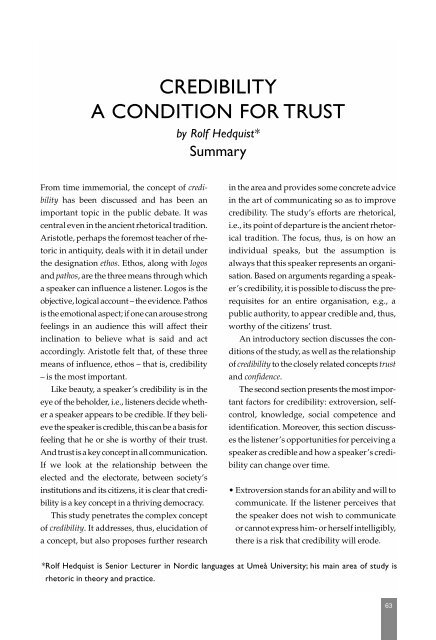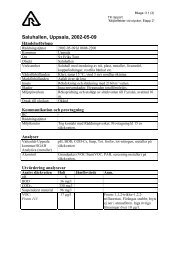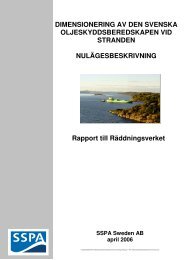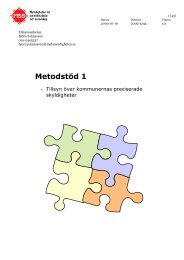TROVÄRDIGHET - Myndigheten för samhällsskydd och beredskap
TROVÄRDIGHET - Myndigheten för samhällsskydd och beredskap
TROVÄRDIGHET - Myndigheten för samhällsskydd och beredskap
Create successful ePaper yourself
Turn your PDF publications into a flip-book with our unique Google optimized e-Paper software.
CREDIBILITY<br />
A CONDITION FOR TRUST<br />
From time immemorial, the concept of credibility<br />
has been discussed and has been an<br />
important topic in the public debate. It was<br />
central even in the ancient rhetorical tradition.<br />
Aristotle, perhaps the foremost teacher of rhetoric<br />
in antiquity, deals with it in detail under<br />
the designation ethos. Ethos, along with logos<br />
and pathos, are the three means through which<br />
a speaker can influence a listener. Logos is the<br />
objective, logical account – the evidence. Pathos<br />
is the emotional aspect; if one can arouse strong<br />
feelings in an audience this will affect their<br />
inclination to believe what is said and act<br />
accordingly. Aristotle felt that, of these three<br />
means of influence, ethos – that is, credibility<br />
– is the most important.<br />
Like beauty, a speaker’s credibility is in the<br />
eye of the beholder, i.e., listeners decide whether<br />
a speaker appears to be credible. If they believe<br />
the speaker is credible, this can be a basis for<br />
feeling that he or she is worthy of their trust.<br />
And trust is a key concept in all communication.<br />
If we look at the relationship between the<br />
elected and the electorate, between society’s<br />
institutions and its citizens, it is clear that credibility<br />
is a key concept in a thriving democracy.<br />
This study penetrates the complex concept<br />
of credibility. It addresses, thus, elucidation of<br />
a concept, but also proposes further research<br />
by Rolf Hedquist*<br />
Summary<br />
in the area and provides some concrete advice<br />
in the art of communicating so as to improve<br />
credibility. The study’s efforts are rhetorical,<br />
i.e., its point of departure is the ancient rhetorical<br />
tradition. The focus, thus, is on how an<br />
individual speaks, but the assumption is<br />
always that this speaker represents an organisation.<br />
Based on arguments regarding a speaker’s<br />
credibility, it is possible to discuss the prerequisites<br />
for an entire organisation, e.g., a<br />
public authority, to appear credible and, thus,<br />
worthy of the citizens’ trust.<br />
An introductory section discusses the conditions<br />
of the study, as well as the relationship<br />
of credibility to the closely related concepts trust<br />
and confidence.<br />
The second section presents the most important<br />
factors for credibility: extroversion, selfcontrol,<br />
knowledge, social competence and<br />
identification. Moreover, this section discusses<br />
the listener’s opportunities for perceiving a<br />
speaker as credible and how a speaker’s credibility<br />
can change over time.<br />
• Extroversion stands for an ability and will to<br />
communicate. If the listener perceives that<br />
the speaker does not wish to communicate<br />
or cannot express him- or herself intelligibly,<br />
there is a risk that credibility will erode.<br />
*Rolf Hedquist is Senior Lecturer in Nordic languages at Umeå University; his main area of study is<br />
rhetoric in theory and practice.<br />
63

















